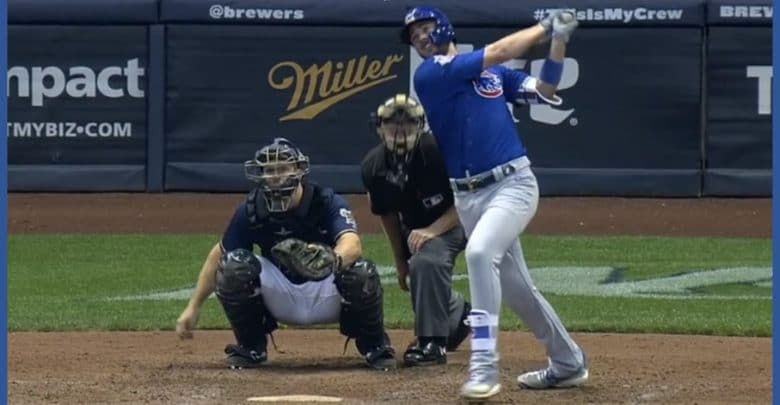
Wittenmyer: Bryant Will Leave Cubs as Free Agent, ‘Theo Doesn’t Have the Money’
The idea that a superstar player will eventually leave his original team at the conclusion of his initial period of contractual control is nothing new in baseball. Nor is it a novel concept as it relates to Kris Bryant, though what had previously been treated as something akin to speaking Voldemort’s name aloud — which is to say you don’t do it — is now becoming de riguer among those who cover the Cubs and baseball in general.
Reports about Bryant rejecting extension overtures have been around since at least the start of the 2017 season, but they lacked any real specificity and were easily brushed aside. And with five more years of control at the time, there was no rush for either fans or the front office to push for a deal. As reports of Bryant’s willingness to ‘just play it out’ continue to pile up, however, Theo Epstein might start feeling the same urgency he’s demanding of his players and staff this winter.
Before we get to the latest, let’s run back what’s been floated over the last few months alone. David Kaplan reported during his show on ESPN 1000 that he’d heard whispers of Bryant turning down an extension “well north of $200 million.” The timing of the rejection was amorphous, though Kap later clarified that “the last few months” could have meant the previous offseason.
Then came a report from ESPN’s Buster Olney that the Cubs were listening to offers on Bryant and could trade him this winter. The title and some of the column’s content was skewed in favor of sensationalism, but Jesse Rogers defended his colleague on Twitter and on air, saying the Cubs were indeed willing to listen.
The latest speculation comes via Gordon Wittenmyer of the Chicago Sun-Times, who was sitting in for David Haugh on the Mully & Haugh show on 670 The Score Tuesday morning (Bryant talk starts at 10:10 mark).
“[I]f you look locally at recent history with Scott Boras, look at Kris Bryant,” Wittenmyer advised. “His last 0-3 pre-arbitration contract, he broke the record by $50,000, $100,000. It was symbolic as much as anything. And then his first year of arbitration, he broke the record by, like, $100,000. Again, symbolic. They’re looking for records.
Ed. note: Bryant’s record pre-arb salary of $1.05 million was just $50K more than Mike Trout had received as a second-year player and the $10.85 million Bryant received in his first year of arbitration broke Ryan Howard‘s previous record by $850,000. That latter mark is much more than merely symbolic, so maybe use that as a grain of salt.
“Bryant’s not coming back as a free agent. And I think that you’ve come to terms with that, I think you came to terms with that very early on in the process, maybe even before he was brought up to the big leagues. This idea that the likelihood is that he won’t sign. Because of his agent, because of who he is, he’s gonna get one shot at that really big multi-year contract. And we’ve already seen so far these last couple years, he’s put off their overtures.
“He is in all likelihood gone, so I don’t think you have to make that choice.”
Again, this isn’t a novel concept given what we just reviewed above, though there is perhaps a subtle difference between previous reports and what Wittenmyer espouses here. On one hand, the Cubs would be so sure of Bryant’s imminent departure that they’d have no choice but to trade him — perhaps with as many as three years of control remaining — to recoup some value. On the other, the Cubs would sort of hold out hope and the decision to leave would be Bryant’s. Well, sort of.
Think of it like the difference between Manny Machado and Bryce Harper at the 2018 deadline. Knowing they had no chance to re-sign their star shortstop, the Orioles traded Machado to the Dodgers and got what they could in return. Believing they could somehow retain Harper, the Nationals held onto him and even offered up a $300 million contract at the end of the season. It didn’t work, but still.
So in a weird way, the prospect of Bryant leaving as a free agent could actually signify a more hopeful outlook on the part of the front office. Is that splitting hairs and trying to be Pollyanna? Maybe, but that’s the best anyone can really do at this point as long as an extension remains as real as a pot of gold at the end of a double rainbow (which it should because Bryant’s got every right to max out his earning potential).
As for the reality of the more immediate situation, Wittenmyer addressed the need for pitching, which the Cubs still haven’t managed to develop internally. Combine the likelihood that they’ll need to continue paying for arms with escalating salaries for Bryant, Javy Baez, et al. and the Cubs will be forced to make difficult decisions. Or, more accurately, the front office will need to make those decisions.
“The Cubs have the money,” Wittenmyer said. “Theo doesn’t have the money.”
If we set all this talk aside and take a more pragmatic view, speculation one way or the other matters little at this point. The Cubs would love to lock Bryant up beyond 2021 with an extension that helps both him and the team and I think Bryant likewise understands the appeal of staying put and being a Cub for life. But the money has to be right and this is a front office that held off signing their own new deals until September 2016, just prior to the conclusion of their initial contracts. They’re viewing Joe Maddon the same way, though there’s a bit more nuance to that situation.
The fact of the matter is that Bryant is under contract for three more seasons and he figures to be one of the most productive players in the league during that time. Fully healthy and driven like never before, he’s hoping to exceed an NL-best fWAR projection and shovel dirt on the worries of last season’s shoulder injury. So talk of trades or free agency is premature at this point, but it’s mid-December and nothing else is happening to take our minds off of it.
Now let’s hurry up and get the season started so the sound of Bryant launching moonshots can drown out the whispers of his potential departure.

